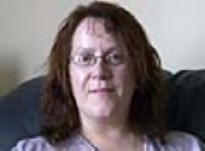Elaine - Interview 06

More about me...
One morning Elaine woke up and didn’t feel quite right but was too busy to think about it. A few months later she had a persistent sore throat and went to her GP, who said it was a viral infection that would go away. She later developed pains under her ribs which the GP suspected was a pulled muscle from coughing. Then her health deteriorated and at times she had difficulty looking after her children. She had pains in her legs, headaches, bleeding gums, lumps behind her ears, tiredness and breathing difficulties. Over the next three weeks she went to the surgery twice more with the headaches and sickness and was given two courses of antibiotics and told it would go away. On a third occasion she went about a different problem and the doctor suggested a blood test. A few days later the doctor phoned and asked her to come in to get the results, which showed she had leukaemia.

